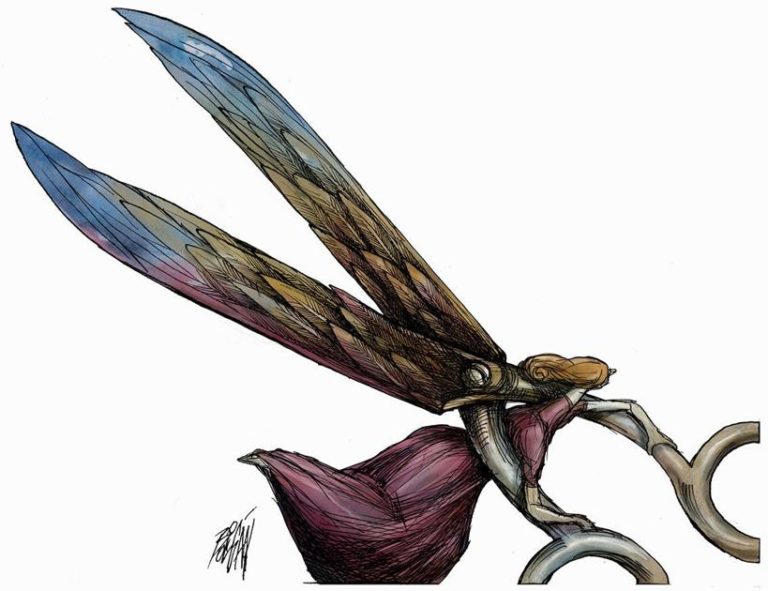

Last month, Hungary and Poland successfully got the term “gender equality” removed from a European Union social summit in Portugal. In March, President Recep Tayyip Erdogan pulled Turkey out of the Istanbul Convention, a legally binding Council of Europe treaty to tackle violence against women and hold perpetrators to account. In Azerbaijan, authorities have used a smear campaign to target women’s rights activists.
Such stories abound, yet commentators rarely connect them to broader trends. Experts rightly anguish over rising authoritarianism. Yet they have spent relatively little time looking at one of the authoritarians’ favorite wedge issues: gender.
This strategy is as old as authoritarianism itself. Dictators are adept at using fear — focused on foreigners, cultural change or minorities — to divide and distract. They are happy to exploit traditional hierarchies to this end. Gender differences come in especially handy.
Take the issue of domestic violence. Vladimir Putin’s Russia has scaled back numerous domestic violence laws, while India’s aspiring strongman Narendra Modi has fought against criminalizing marital rape. Male coercion within the family mimics the power structure of the authoritarian state itself. Dissenters are silenced; perpetrators enjoy impunity. Society is divided — men are above women, the state above men. Erdogan has complained that the Istanbul Convention criminalization of marital violence threatened the order and sanctity of marriage. Women’s advocates warn that this will solidify women’s status as second-class citizens — not to mention cost lives.
Similarly, some authoritarians use “honor cultures” to drive women out of political life, removing a potential challenge to one-man rule. Women in politics the world over describe a litany of sexualized threats, often carried out by state security services or police. Releasing video recordings of female leaders and activists’ personal lives, as is happening in Azerbaijan today, can be a highly effective tactic for forcing women out of the public sphere. One Azerbaijani activist attempted suicide in 2020 after being harassed online and having her personal life exposed.
The appeal to “conservative values,” which often centers on gender issues, can have devastating effects. Russia has used this tactic with particular success in Georgia, where it has depicted feminism and LGBTQ rights as “anti-Georgian.” This has helped to further a narrative of alleged Western decadence, thus attempting to undermine the country’s aspirations to join the E.U. and NATO, a goal front and center to Russia’s hybrid efforts. The idea was not to focus on a pro-Russian narrative quite yet but first to build an anti-Western one.
The Kremlin created and circulated content featuring Scandinavian countries forbidding the use of “he” and “she” pronouns, images of gay pride rallies in Germany with men in drag, or narratives of young career women eschewing marriage. These efforts have produced tangible results. Georgia embedded a heterosexual marriage clause in its 2018 constitution — even though no one in the country had been demanding same-sex marriage. The country fell right into Russia’s trap, and illiberalism scored a victory. Public opinion polls showed that more than 40 percent of Georgians believed NATO dictates that candidate countries adopt “Western cultural values.” Make no mistake: Gender is a national security issue.
The United States has also been the target of Russia’s efforts to create and amplify divisive narratives. At the Alliance for Securing Democracy, we have tracked Russian state-backed narratives that target democracies. Americans should be aware, for example, that Russian information operations, including at least 15 articles on the topic from RT over the last two months alone, are fueling the domestic movements to ban trans girls and women from competing in women’s sports. Russian state-backed media has also often combined gender issues with other favored narratives such as criticism of elites, the mainstream media, “identity politics,” and “wokeness” or political correctness.
We need to wake up to the reality that the steady drip of authoritarian attacks related to gender is a strategy, not a series of one-off events. Authoritarians are fanning existing embers of intolerance and misogyny by targeting women in public life, condoning domestic violence and launching culture wars around the LGBTQ community. Strongmen benefit from a caste system in society to ensure their control and to weaken safeguards against suppression and violence.
To defend against this threat, we must carefully pick through information and events with a gender lens. Disinformation monitoring groups can track and expose gendered narratives. Journalists can be trained to limit the amplification of authoritarian themes. To help inoculate democratic institutions, the establishment of parliamentary gender equality committees, such as those of Denmark, India, Georgia and the Dominican Republic, can scrutinize legislation to protect against discriminatory impacts.
Going on the offense is also critical. Pre-emptive narratives about a tolerant, liberal and just national identity are key, such as Estonia’s deployment of “elves” to play offense against the trolls.
Yet building resilience to authoritarian tactics involves complex challenges. Too often, citizens reward strongmen for stoking these divisions with an election win. This is a long-haul struggle. We cannot lose heart.
Laura Thornton is director of the Alliance for Securing Democracy of the German Marshall Fund of the United States. Thornton has lived for 25 years around the world, working on democracy, elections and human rights.